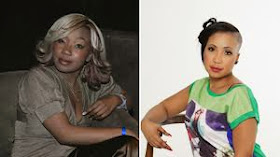FROM CITY PEOPLE MAGAZINE
“How I Met & Fell In Love With Wole Soyinka” – Wife, Folake Reveals
Jul 27, 2014
Posted by In
Interview, News
Tagged Folake Doherty-Soyinka Interview, Folake Soyinka Interview, Wole Soyinka Love Story, Wole Soyinka Marriage, Wole Soyinka Wife
Comments 0
Not many people know who Prof. Wole
Soyinka’s wife is. Not many know their love story. A few weeks ago,
Folake Soyinka opened up to The News magazine on her love story,
revealing how they first met at University of Ife (now Obafemi Awolowo
University) whilst she was a student. Excerpts:
How would you describe Prof Wole Soyinka as a husband, father and a husband being?
He is the best human being you can think of. He is very concerned about other people and their suffering even to his own detriment sometimes. H e is just a warm person. Looking at him, you may not know this, but that is who he is. He is someone you would want as a friend. He is very loyal. He is the best friend you can ask for. On National Public Radio –NPR – I listen every morning to a popular programme called Story Corp. One day, they featured a couple that had been married for 70 years, being interviewed by their great grandchildren. They asked the couple why their marriage had lasted so long and both replied that they never fell out of love at the same time.
He is the best human being you can think of. He is very concerned about other people and their suffering even to his own detriment sometimes. H e is just a warm person. Looking at him, you may not know this, but that is who he is. He is someone you would want as a friend. He is very loyal. He is the best friend you can ask for. On National Public Radio –NPR – I listen every morning to a popular programme called Story Corp. One day, they featured a couple that had been married for 70 years, being interviewed by their great grandchildren. They asked the couple why their marriage had lasted so long and both replied that they never fell out of love at the same time.
When one was tired the other was still
holding on and I said to myself, “that just describes my marriage.” When
he was tired I held on and when I was tired he held on. And now, none
of us is tired. We’re still holding on.As a father, I think his children
can answer that better but I can tell you that it is difficult to be
his child because of his nature. He is not home very often. For a wife,
you pretty much have an inkling into what you are getting when you marry
someone like him, but a child does not. It’s something you’re into. He
recognizes it and alludes to it in is dedication in his book, You Must
Set Forth at Dawn” where he wrote. “To my stoically resigned children.
“No one likes to share those they love, but they have to share their
father with the world. It is difficult for them all.
With my own boys, right from the
beginning, I shared with them an advice my sister-in-law, Dr. Folabo
Soyinka-Ajayi, gave me when I was newly married. She said her brother
“loved their mother a lot but she was never able to own him, not that
she didn’t try. She said no one can own him, not is siblings, his wife
or his children, he is a world citizen.” I explained that to my boys as
soon as they began to notice their father’s absence when other kids had
theirs. It is something you understand more as you grow older, even
then, it is difficult to accept. I think they grew to understand this,
and they feel loved and they got used to him, so that helps. I also
think that he relates better with older children. Now, I watch him sit
and talk with some of his children who are all now older, and marvel at
how the relationships have transformed. It is nice to see. That is him
as a father. Professor Soyinka is a great provider as well; you are not
going to get the Lamborghini or Bentley Continental GT, but you will get
your school fees and it won’t be late. He is very responsible.
Do you sometimes feel that you are in competition with quite a number of other women who want is attention?
No, right from the beginning, I knew he liked me as a person. I am not talking about love now, even though, I knew he loved me. We are great friends and we laugh together a lot. I knew that he wouldn’t deliberately hurt or humiliate me. I also know that there is nothing you can do to stop two consenting adults. Women are always around under all kinds of guises but I have never felt in competition with anyone. Sometimes it intrudes on our lives, but no competition.
No, right from the beginning, I knew he liked me as a person. I am not talking about love now, even though, I knew he loved me. We are great friends and we laugh together a lot. I knew that he wouldn’t deliberately hurt or humiliate me. I also know that there is nothing you can do to stop two consenting adults. Women are always around under all kinds of guises but I have never felt in competition with anyone. Sometimes it intrudes on our lives, but no competition.
How did your love affair start?
As I said, I knew he always liked me from when I was in the University of Ife but I was young and he was so accomplished, so I was kind of worried. After I left Ife and went to do my National Service –NYSC in Kaduna, Dr. Biodun Jeyifo came to visit me and said Kongi had been looking for me. After the service year, Dr. Yemi Ogunbiyi who was at The Guardian got me a job there and one day, he stopped by. The rest of the story is in the public domain with all kinds of unbelievable variations. You also know it. Everybody was part of that story.
As I said, I knew he always liked me from when I was in the University of Ife but I was young and he was so accomplished, so I was kind of worried. After I left Ife and went to do my National Service –NYSC in Kaduna, Dr. Biodun Jeyifo came to visit me and said Kongi had been looking for me. After the service year, Dr. Yemi Ogunbiyi who was at The Guardian got me a job there and one day, he stopped by. The rest of the story is in the public domain with all kinds of unbelievable variations. You also know it. Everybody was part of that story.
What was the period of courtship like?
It was interesting. I was working at The Guardian at that time, he was slowly moving out of Ife. He was exploring where to build a house between Ibadan and Abeokuta. In the end, he chose Abeokuta. Prior to building our house, he lived in Idi-Aba area of Abeokuta. So, for most of our courtship, we lived there and we continued living there after we were married. I worked Monday through Friday and most weekends when I wasn’t working I was in Abeokuta. He would sometimes visit me in Lagos and we spent time together there. Oftentimes, he was busy as I was. Mr. Lade Bonuola, the editor of The Guardian then kept all of us, his reporters, one our toes. We saw each other often but we couldn’t do everyday things that people do because of who he is, but it was nice, very nice. I look back fondly to those days.
It was interesting. I was working at The Guardian at that time, he was slowly moving out of Ife. He was exploring where to build a house between Ibadan and Abeokuta. In the end, he chose Abeokuta. Prior to building our house, he lived in Idi-Aba area of Abeokuta. So, for most of our courtship, we lived there and we continued living there after we were married. I worked Monday through Friday and most weekends when I wasn’t working I was in Abeokuta. He would sometimes visit me in Lagos and we spent time together there. Oftentimes, he was busy as I was. Mr. Lade Bonuola, the editor of The Guardian then kept all of us, his reporters, one our toes. We saw each other often but we couldn’t do everyday things that people do because of who he is, but it was nice, very nice. I look back fondly to those days.
When he eventually proposed that he wanted to marry you, was there any objection from anywhere?
I think there were objections from everywhere except from my sisters and brother who were happy if I was. I also had the support of his siblings here. My parents along with most of my relatives objected, not because of anything, they just felt he was too famous and too accomplished. They worried about that. But within a few months after we were married, my parents had changed their minds and they loved him until they both passed away. His close friends didn’t have a problem with it but almost everyone had an opinion. Then came the Nobel Prize in 1986 and that derailed everything for a couple of years. More than a quarter of a century later, those opinions didn’t count, we’re still trudging along. I have enjoyed tremendous love because of him.
I think there were objections from everywhere except from my sisters and brother who were happy if I was. I also had the support of his siblings here. My parents along with most of my relatives objected, not because of anything, they just felt he was too famous and too accomplished. They worried about that. But within a few months after we were married, my parents had changed their minds and they loved him until they both passed away. His close friends didn’t have a problem with it but almost everyone had an opinion. Then came the Nobel Prize in 1986 and that derailed everything for a couple of years. More than a quarter of a century later, those opinions didn’t count, we’re still trudging along. I have enjoyed tremendous love because of him.
Apart from wines which we all know he loves drinking, what re his favourite foods?
He is not a big eater. Even when he eats, it is always in small quantities. The boys always want to go out to each with him because they usually end up eating his food. He likes salami, pasta, moin-moin cooked in leaves especially the stray part that hides between the folded leaves. He doesn’t eat much and I guess that is why he is so slim.
He is not a big eater. Even when he eats, it is always in small quantities. The boys always want to go out to each with him because they usually end up eating his food. He likes salami, pasta, moin-moin cooked in leaves especially the stray part that hides between the folded leaves. He doesn’t eat much and I guess that is why he is so slim.
I understand he is a good cook.
He cooks and he is quite good at it. He even cooked about two days ago. When the boys were really little, one day in California, he called us all to the kitchen and said he wanted to have a family meeting. They were so young I don’t even think they had any concept of what a family meeting was. He lined all three according to their heights and asked me to sit. He said he has something to tell us and he was only going to say it once. He whipped out some cooking utensils, moved them around noisily inside the pot, threw some up, caught them, performed a few tricks and then told us to listen up. He said there were only three people in the world that can cook pasta like he does: one is dead, the other lives in Sicily, Italy, and he is the third one and he is going to cook something the likes of which we had never eaten. He cooked pasta that day and we truly enjoyed it. True dramatist! Now when all else fails, he cooks pasta.
He cooks and he is quite good at it. He even cooked about two days ago. When the boys were really little, one day in California, he called us all to the kitchen and said he wanted to have a family meeting. They were so young I don’t even think they had any concept of what a family meeting was. He lined all three according to their heights and asked me to sit. He said he has something to tell us and he was only going to say it once. He whipped out some cooking utensils, moved them around noisily inside the pot, threw some up, caught them, performed a few tricks and then told us to listen up. He said there were only three people in the world that can cook pasta like he does: one is dead, the other lives in Sicily, Italy, and he is the third one and he is going to cook something the likes of which we had never eaten. He cooked pasta that day and we truly enjoyed it. True dramatist! Now when all else fails, he cooks pasta.
What are the things you notice when he is writing or reading seriously?
We leave him alone. We don’t intrude. I don’t know of many people who love what they do for a living like he does. He doesn’t like the administrative part of it like replying endless emails, but he loves writing. I say to my kids how lucky he is to have found something he loves and then do it for a living. He doesn’t bring in as much money as most people think, but then, that is not his motivation for writing. Even when he arrives home from a different time zone, he would wake up in the morning, go into his study, probably at about seven in the morning and if he can’t sleep, he would go in at 3am and work until mid-day non-stop. So, when the kids are going to school in the morning, they don’t even bother to go into the study too say good morning, they just leave him alone.
We leave him alone. We don’t intrude. I don’t know of many people who love what they do for a living like he does. He doesn’t like the administrative part of it like replying endless emails, but he loves writing. I say to my kids how lucky he is to have found something he loves and then do it for a living. He doesn’t bring in as much money as most people think, but then, that is not his motivation for writing. Even when he arrives home from a different time zone, he would wake up in the morning, go into his study, probably at about seven in the morning and if he can’t sleep, he would go in at 3am and work until mid-day non-stop. So, when the kids are going to school in the morning, they don’t even bother to go into the study too say good morning, they just leave him alone.
When he comes out, does he sometimes share the joy and pleasure of his creation with you?
No, he doesn’t discuss what he is working on with anybody. Sometimes, when he is done with a manuscript and he is sending it to the publishers, that’s when I find out what he’s been working on.
No, he doesn’t discuss what he is working on with anybody. Sometimes, when he is done with a manuscript and he is sending it to the publishers, that’s when I find out what he’s been working on.
Do you sometimes help him edit?
No, I do not interfere. When he brings cover designs for the book, he may ask me which I prefer and he may or may not accept my choice. That’s the extent of my involvement in his creative work.
No, I do not interfere. When he brings cover designs for the book, he may ask me which I prefer and he may or may not accept my choice. That’s the extent of my involvement in his creative work.
When you turned 50 two years ago, he danced with you. Does he love to dance? Between both of you who is a better dancer?
Of course, I am a better dancer and I dance more often. I am sure if you ask him, he would say he is a better dancer and that would not be true. He doesn’t dance often. Sometimes, when we are with Uncle Tunji Oyelana of the Benders, he would go on the microphone and they would start signing and a few hours later, they would be arguing about how a song should go and its interpretation. He sings more than he dances. Recently both of us went to see a play and when we got home he started to mimic the dancers, it was hilarious because it was break dancing.
Of course, I am a better dancer and I dance more often. I am sure if you ask him, he would say he is a better dancer and that would not be true. He doesn’t dance often. Sometimes, when we are with Uncle Tunji Oyelana of the Benders, he would go on the microphone and they would start signing and a few hours later, they would be arguing about how a song should go and its interpretation. He sings more than he dances. Recently both of us went to see a play and when we got home he started to mimic the dancers, it was hilarious because it was break dancing.
The late Chief Bola Ige once
told me that Wole Soyinka may look stone-faced in public, but he can be
incredible moved to tears by the pain of others. How true is that?
It is true what Chief Bola Ige said. He is moved by the sufferings of others even to the extent that it affects us at home. You know for sure when something is bothering him and it bothers him more when he cannot do anything about it. You have no idea how the kidnap of the Chibok girls has affected our lives. It is constantly on his mind. Death also bothers him. Recently, when one of is daughters, Yetade, passed away, he wept. The boys had never seen him cry but this time he was weeping uncontrollably. It was shortly after Christmas, so we were all home when the news came. I think that incident rocked him. They say time heals, but I don’t know how time heals the death of a beloved child.
It is true what Chief Bola Ige said. He is moved by the sufferings of others even to the extent that it affects us at home. You know for sure when something is bothering him and it bothers him more when he cannot do anything about it. You have no idea how the kidnap of the Chibok girls has affected our lives. It is constantly on his mind. Death also bothers him. Recently, when one of is daughters, Yetade, passed away, he wept. The boys had never seen him cry but this time he was weeping uncontrollably. It was shortly after Christmas, so we were all home when the news came. I think that incident rocked him. They say time heals, but I don’t know how time heals the death of a beloved child.
You both have three sons together, how are they doing?
They are all doing very well. It’s just the two of us at home now that the children have all gone in different directions. The first two have been away for a while. One graduated from Stanford University and is now in medical school, the other went to Colgate University and would like to go to Law School and my last is headed to Harvard University where he will be studying Computer Science and Engineering. Fortunately for us, each of them got a scholarship, so we’ve been truly blessed.
They are all doing very well. It’s just the two of us at home now that the children have all gone in different directions. The first two have been away for a while. One graduated from Stanford University and is now in medical school, the other went to Colgate University and would like to go to Law School and my last is headed to Harvard University where he will be studying Computer Science and Engineering. Fortunately for us, each of them got a scholarship, so we’ve been truly blessed.














































